
How The Fashion Industry Doubled Down On Sustainability In 2018
The issue of sustainability took centrestage in the fashion industry in 2018, with multiple brands making pragmatic steps to addressing their environmental impact. A look at some of the biggest strides made. PVH Corp PVH, the company that owns Tommy Hilfiger, Calvin Klein and Speedo, signed not one but three major initiatives in 2018 in a bid to reduce the waste generated by its fashion brands and the industry in general. The group joined the Global Fashion Agenda (GFA), a non-profit initiative that aims to boost sustainability levels within the fashion business, teamed up with Fashion For Good (FFG), an organisation that supports startups in becoming more sustainable, and became a core partner and member of the Advisory Board of The Ellen MacArthur Foundation, which works with businesses, government and academia to accelerate and promote a transition to circular economy. Guess Denim brand Guess has had a troubled year, but its focus on sustainability remained strong, with the launch of a circular fashion recycling programme dubbed "Resourced". The concept offers US shoppers in-store discounts when they donate used clothing, in an effort to give second-hand pieces new life, and reduce textile waste. The company plans to roll it out globally by 2020. Gap Gap Inc - which counts Gap, Old Navy and Banana Republic on its books - pledged this year to save 10 billion litres of water by the end of 2020. The fashion conglomerate aims to economise on water resources by focusing on product innovation and improving efficiency at its fabric mills and laundries, and hopes that the initiative will help affected communities achieve better access to clean water and sanitation. Kering In December, the luxury fashion and lifestyle conglomerate Kering announced the launch of the "Sustainable Innovation Award" - a new fashion prize in China. Launched in partnership with the innovation platform Plug and Play, the award will single out innovative startups and technologies in Greater China that are offering a positive environmental and social impact by focusing on raw materials, green supply chain concepts and the circular economy, in an attempt to encourage sustainably-minded fashion processes. Three winners will receive mentorship and networking opportunities to develop their concepts. UN charter December also saw 43 fashion businesses, including Burberry, H&M, Stella McCartney and Hugo Boss, commit to fighting climate change with the signing of a new "Fashion Industry Charter for Climate Action", a UN Climate Change initiative. The charter aims to address the role of the fashion industry "on both sides of the climate equation" - meaning that it will focus on the ways in which the sector can reduce its greenhouse gas emissions and focus on sustainable development via 16 different commitments. Its goal is for the industry to achieve net zero emissions by the year 2050.
Textile Excellence
If you wish to Subscribe to Textile Excellence Print Edition, kindly fill in the below form and we shall get back to you with details.













